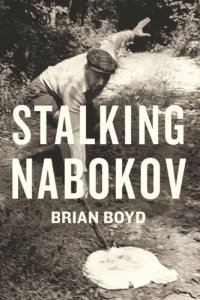
Ebook: Stalking Nabokov
Author: Brian Boyd
- Year: 2011
- Publisher: Columbia University Press
- Language: English
- pdf
In this book, Brian Boyd surveys Vladimir Nabokov's life, career, and legacy; his art, science, and thought; his subtle humor and puzzle-like storytelling; his complex psychological portraits; and his inheritance from, reworking of, and affinities with Shakespeare, Pushkin, Tolstoy, and Machado de Assis. Boyd also offers new ways of reading Lolita, Pale Fire, Ada or Ardor, and the unparalleled autobiography, Speak, Memory, disclosing otherwise unknown information about the author's world. Sharing his personal reflections as he recounts the adventures, hardships, and revelations of researching Nabokov's life? oeuvre?, he cautions against using Nabokov's metaphysics as the key to unlocking all of the enigmatic author's secrets. Assessing and appreciating Nabokov as novelist, memoirist, poet, translator, scientist, and individual, Boyd helps us understand more than ever Nabokov's multifaceted genius.
At the age of twenty-one, Brian Boyd wrote a thesis on Vladimir Nabokov that the famous author called "brilliant." After gaining exclusive access to the writer's archives, he wrote a two-part, award-winning biography, Vladimir Nabokov: The Russian Years (1990) and Vladimir Nabokov: The American Years (1991). This collection features essays written by Boyd since completing the biography, incorporating material he gleaned from his research as well as new discoveries and formulations.
Boyd confronts Nabokov's life, career, and legacy; his art, science, and thought; his subtle humor and puzzle-like storytelling; his complex psychological portraits; and his inheritance from, reworking of, and affinities with Shakespeare, Pushkin, Tolstoy, and Machado de Assis. Boyd offers new ways of reading Nabokov's best English-language works: Lolita, Pale Fire, Ada, and the unparalleled autobiography, Speak, Memory, and he discloses otherwise unknown information about the author's world. Sharing his personal reflections, Boyd recounts the adventures, hardships, and revelations of researching Nabokov's biography and his unusual finds in the archives, including materials still awaiting publication. The first to focus on Nabokov's metaphysics, Boyd cautions against their being used as the key to unlock all of the author's secrets, showing instead the many other rooms in Nabokov's castle of fiction that need exploring, such as his humor, narrative invention, and psychological insight into characters and readers alike. Appreciating Nabokov as novelist, memoirist, poet, translator, scientist, and individual, Boyd helps us understand more than ever the author's multifaceted genius.